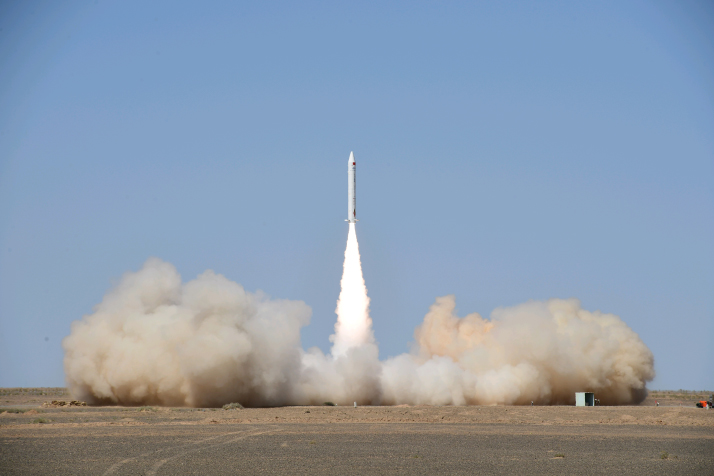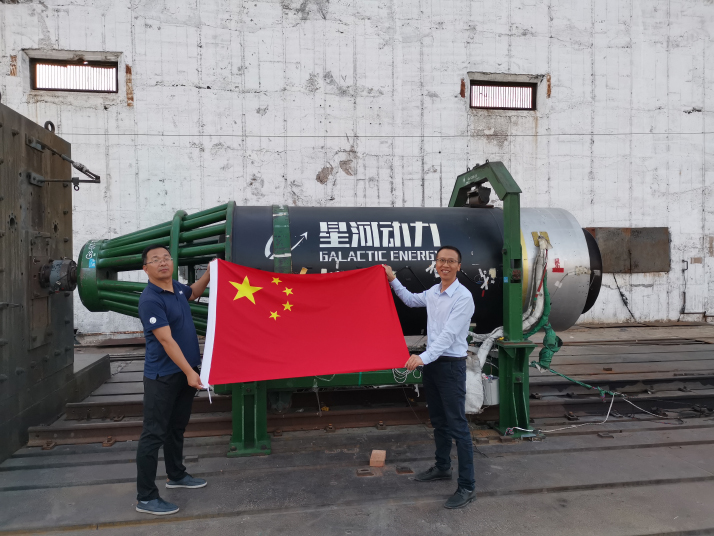|
||||||||||
| Home Nation World Business Opinion Lifestyle ChinAfrica Multimedia Columnists Documents Special Reports |
|
||||||||||
| Home Nation World Business Opinion Lifestyle ChinAfrica Multimedia Columnists Documents Special Reports |
| ChinAfrica |
| On the Rise |
| China's private space industry makes breakthroughs |
| By Hu Fan | VOL.11 December ·2019-12-13 |

The launch vehicle SQX-1 Y1 of iSpace company takes off from the Jiuquan Satellite Launch Center on July 25 (XINHUA)
At exactly 1:00 p.m. on July 25, the crowd at Jiuquan Satellite Launch Center in northwest China's Gansu Province got nervous as the rocket at the launching pad started to eject fire at the end of the countdown. They were witnessing whether a rocket developed by a private space company in China can be successfully launched and carry satellites into their orbits.
The rocket was produced by iSpace, a Beijing-based private space company, and was loaded with two satellites and other commercial and experimental weights. Although iSpace conducted two successful launches the year before for suborbital missions, scientists of the company were not sure about their first orbital mission.
Four months before the July launch, the Jiuquan launch center witnessed a failed rocket launching. A rocket of One Space, another Beijing-based private space company, lost its control less than one minute after the takeoff and fell along with the satellite it carried. And five months before that, a rocket launched at the same center by LandSpace, also a Beijing-based private space company, experienced a malfunction in its third stage during the launch and failed to reach its orbit.
Ispace got lucky. The chief commander of the launch announced a success 1,088 seconds after the ignition. The crowd at the launch center burst into cheers and tears, celebrating the long-awaited moment.
An emerging industry
The success of Ispace came almost 40 years after China launched its first launch vehicle in 1980, and was nothing compared to China's current space capability that has seen Chinese astronauts walking in the space and Jade Rabbit moon rovers working on the Moon.
That capability was largely built by state-owned companies and institutes. In 2014, private companies were allowed to develop and launch rockets. Since then, there has been a quick development of China's private space industry. By the end of 2018, 123 of China's total 141 space companies were privately owned, 57 of which were established within three years, according to a report by Future Aerospace, a Beijing-based institute studying the space industry.
"It is a remarkable achievement for us as private space companies to have sent a rocket into orbit, considering that we have existed for only five years," Liu Baiqi, founder and CEO of Galactic Energy, a Beijing-based space company, told ChinAfrica.
Founded in February last year, the company is still in the R&D stage and has launched no rocket. Yet, it has raised over 300 million yuan ($43 million) in the capital market during its first three rounds of fundraising and has contracted the major payloads for its first rocket to be sent into space in 2020. Liu attributes this recognition by the market to a strong demand for launch capacity in the space industry and strong policy support from the government. According to the Future Aerospace report, about 3,100 commercial satellites are to be sent into the space from China by 2025, creating a market of 17 billion yuan ($2.4 billion) for commercial rocket launches annually.
Since the State Council issued a document in 2014 to encourage the engagement of private investment in the construction of civil space infrastructure, including the production, launch and operation of satellites, the participation of the private sector has been reaffirmed by around a dozen national policies in the following years.
"They were released right at the time we needed them," Liu said. In November last year, the company was certified as a hi-tech company by the Zhongguancun Science Park in Beijing, where many space companies are based. This gave them access to the park's fund and other support.
Liu said the availability of abundant space experts, a legacy of the development of China's space industry that started in the 1950s, has made possible the rapid development of private space companies.
"The manufacturing of launch vehicles involves technology relating to over 20 functions, each requiring experts with rich space R&D experience," said Liu, who has previously worked at several state-owned institutes. He managed to organize a team of over 30 experts before starting the company.

Liu Baiqi (right) and a colleague pose for a photo in front of the rocket engine they have developed (XINHUA)
A prudent approach
Talent is one of the factors for private companies to succeed. As the space industry is a highly complex one with high thresholds in terms of technology, funding, expertise and management and high risk of failure, private space companies need to be more careful with each step they take.
Fortunately, they have a precursor to learn from, which is SpaceX, a leading private space company in the U.S. And the first lesson they learn from it was to aim high but start with a practical target. When it was founded in 2002, SpaceX adopted established liquid oxygen/kerosene technology for its first rocket, instead of blindly pursuing any new technology. Liu said this has enabled the company to grab a global market share of over 60 percent for commercial rocket launches. In the case of Galactic Energy, although it has the long-term ambition of exploiting space resources, its current target is to start with small, single-use rockets powered by solid fuel, which is a safer choice as it involves less risks in terms of technology and investment.
The company has also carefully designed its R&D plan with detailed specification for each milestone. Liu said this will enable them to avoid unnecessary steps and limit the required funding to 150 million yuan ($21 million) before their first launch.
This, however, doesn't mean they are just replicating what has previously been done by other companies. They are adding to their products what they call minor practical innovations, such as a new type of altitude control thruster or an improvement in fuel-burn efficiency.
"For commercial space companies, especially startups, the focus is on meeting market needs with relatively mature technology," Liu said, adding that this enables his company to start selling payloads and making money, reducing the pressure for fundraising.
Liu admits there is obviously a long way to go for them compared to leading players such as SpaceX. But he is optimistic about China's private space industry based on the rapid development he has witnessed over the past several years.
"China's private space industry may have a competitive edge in terms of cost and the ability to execute contracts, which will make it a key global player in the foreseeable future," he said.
Besides, Liu believes the success of SpaceX, as well as more and more successful launches by China's private players, has brought more confidence to private space companies. Though starting late, these companies have grown quickly with clearer understanding about the market demand.
According to its plan, Galactic Energy will ignite its first launch vehicle in March next year, also at the Jiuquan Satellite Launch Center. If successful, it will mean a remarkable speed for a startup space company to harness the rocket-launching capability.
(Comments to hufan@chinafrica.cn)
|
||||||||||||
| About Us | Contact Us | Advertise with Us | Subscribe |
| Copyright Beijing Review All rights reserved 京ICP备08005356号-5 京公网安备110102005860号 |